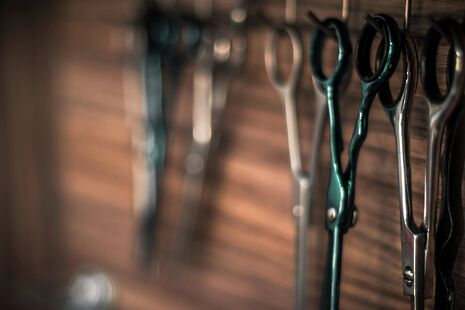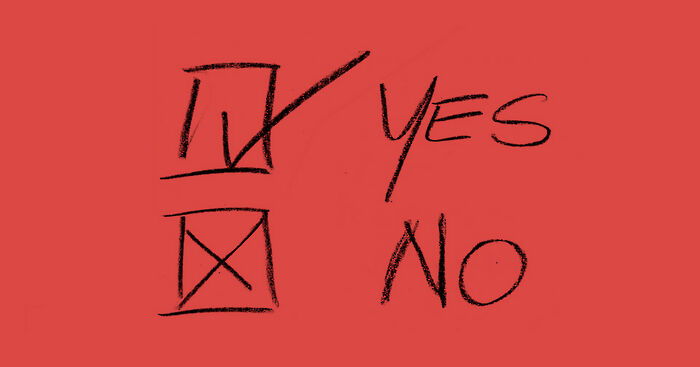Cutting my hair short, I felt at odds with my femininity
“Suddenly, I no longer felt comfortable in skirts or archetypal ‘feminine’ clothes”, writes Madeleine Wakeman, about after she had her hair cut short

‘But, are you sure?’ she asks me, for the fifth time.
I’m not a spontaneous person. I don’t like to change plans last minute, or to make spur-of-the-moment decisions. Yet there I was, sitting in a big leather chair in front of a hairdresser with a pair of scissors in one hand and a look of pure concern on her face.
The truth is, I wasn’t sure. I had no idea what I was doing, and I could never have predicted the impact that cutting off my long, dark curly hair would have on my life. I just wanted to try something new. For me, it really wasn’t that big of a deal. It will always grow back, right? I was excited to explore a more masculine side of myself, and was empowered by the uneasy looks on the faces of everyone I told about my plan in the 24 hours prior.
I think it’s important to understand that I wasn’t going for a feminine Emma Watson pixie cut. I wasn’t even going for a relatively long Ruby Rose sweep. I wanted a classic, run-of-the-mill ‘short, back and sides’.
My confidence is an unstable facade, rather than a demand for respect
The first thing I noticed after getting The Cut, was that I grew paranoid very quickly. Previously when I had long, feminine curls, it didn’t really matter what I wore. It would be plainly obvious, from all angles, that I identified as female. Some days I would wear skirts or dresses, and other days I would wear jeans and shirts.
I hadn’t realised that after I got my hair cut, this would change. Suddenly, I no longer felt comfortable in skirts or archetypal ‘feminine’ clothes. I felt that I had to choose: I could either have long hair and wear ‘feminine’ clothes, or I could have short hair and wear ‘masculine’ clothes. I’m ashamed to write that I still am yet to put on a skirt since cutting my hair.
Bring your voice — write for Varsity Features
Interested in writing for Varsity’s features section? Join our Facebook group to see our latest commissions, or email our Features team with a 150-word pitch of your article idea.
Despite my desperation to fit into one of those pre-determined boxes, over the course of the following months it became overtly obvious that I was failing to do so. I became conscious that I was no longer welcome in gendered spaces. I noted every look I was given by each passing stranger, determined to levy some amount of judgement to it. The standard, if slightly patronising, greeting ‘hello darlin’’ soon turned to ‘alright mate?’. The glares I received when I entered the women’s bathroom could no longer be mistaken for tired faces. Men no longer found it attractive to see me holding hands with a girl, and the whistles and cheers turned to looks of disgust, and jeers. I was even stopped by a man from entering the women’s bathroom, and directed towards the men’s.
I’m not sure if it’s these small changes that have led to such a marked change within myself. I feel like I hold myself taller, and stronger. I try and look bigger, and broader. No longer am I scared that I’ll be hassled and harassed by men wanting my number, but I’m scared that I’ll be forced into a physical confrontation. My voice has become louder, and, at times, more aggressive.
To an extent, cutting my hair has opened my eyes further to the lived experiences of transgender and non-binary individuals. I walk through the door of the women’s bathroom, scared that I’ll be told I don’t belong there. But what about those who face this, and are also told by a transphobic society that they don't belong? Or those who stare at both doors, not knowing which one they would feel more comfortable walking through? I can grow my hair back out, but others can’t change the gender they identify with, or their lack of gender.
It is difficult to assess whether or not I like the changes I have observed within myself, and to do so seems like a meaningless exercise for something I didn’t choose. They have simply become a part of me, a twisted type of survival tactic. Perhaps the thing that has shocked me most is that, as men’s attraction to me notably dwindled, my own self-image suffered a similar fate. My confidence is an unstable facade, rather than a demand for respect. This is confusing for me. I’m not attracted to men, and I certainly don’t relish their romantic or sexual attention. So why is it that I am reluctant to stray from the traditional conceptions of femininity that men typically find attractive?
I’m not sure what I’ll do in the future and really, for me, it doesn’t matter. For me, it is just hair. But if I were to sit in that chair again, and hear those words: ‘are you sure?’, my answer wouldn’t change. Yes, I am sure. I am sure that it is entirely my choice to present myself however I wish to, to walk through whichever door I choose to, and to do so without judgement.
 News / Caius mourns its tree-mendous loss23 December 2025
News / Caius mourns its tree-mendous loss23 December 2025 News / Clare Hall spent over £500k opposing busway 24 December 2025
News / Clare Hall spent over £500k opposing busway 24 December 2025 Comment / The ‘class’ of Cambridge24 December 2025
Comment / The ‘class’ of Cambridge24 December 2025 Comment / Yes, I’m brown – but I have more important things to say22 December 2025
Comment / Yes, I’m brown – but I have more important things to say22 December 2025 Interviews / Politics, your own way: Tilly Middlehurst on speaking out21 December 2025
Interviews / Politics, your own way: Tilly Middlehurst on speaking out21 December 2025








